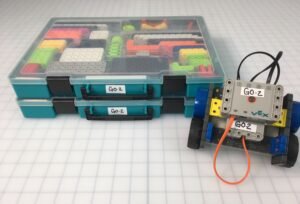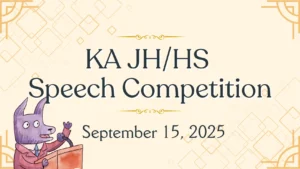Enjoy this short video snippet about ETON House International School from our 2024 Expo.
Transcript
ETON House International School
ISTimes Global: (00:00) Hello, we are here with Bipasha here with uh ETON House International School. Welcome.
ETON House International School (Bipasha): (00:06) Thank you very much.
ISTimes Global: (00:07) I have I’ve noticed that uh your desk has been very busy here at the Expo. Congratulations.
ETON House International School (Bipasha): (00:13) Yes, thank you. We’re very honored to be so popular in Japan. In fact, in our schools in Singapore as well, we have a lot of Japanese families. So it’s always a pleasure to come back to Japan and be a part of this wonderful community and have conversations with families here.
ISTimes Global: (00:26) Well, that’s great. Well then what do you think draws families to your school? I would I would uh love to learn more about uh ETON International School.
ETON House International School (Bipasha): (00:35) So we started about 30 years ago and it was started by a mother who wanted to provide a certain kind of education for young children. She wanted children to be happy, to be confident, to be enjoying their childhood rather than be, you know, asked to do things and fill out worksheets, etc. She wanted learning to be enjoyable and fun. So that was the original philosophy and we’re quite happy that we’ve stayed on and we’ve committed to that philosophy all the years. So we start with children as young as infant care all the way to high school. And one of the reasons why families come back to us is because it is like a second home for them. The community is very, very important for us. Our schools are boutique in size, but that also translates into a highly personalized level of conversation and engagement with the community with our families. The other reason why we feel families come to us and we are a very international community is because of the language provision that we offer. So we are very committed to a bilingual foundation. So Chinese, Japanese and other languages are a big part of our program. And we also have a very diverse range of nationalities. So we’re not really a British or an American or a Singaporean, we’re a, you know, an international community of learners. So be it in the nationality of our staff, be it in the nationality of the families who come to us, we’re very, very diverse.
ISTimes Global: (01:55) So you’ve actually uh mentioned that you have different programs and different languages. Is it is it like that the each school has all their education in English, but then you offer secondary, third languages that they can take at the school?
ETON House International School (Bipasha): (02:09) Yes, so we’re committed to a bilingual foundation. So English is of course the main language of communication, instruction, study, whatever you want to call it. But we also have a very strong second language provision or a bilingual provision, which means children can be doing two languages at the same time and we can create a sort of a bilingual, bicultural foundation for children all the way from early years to high school.
ISTimes Global: (02:32) And that’s often a um uh concern that Japanese families have is they’re always afraid, well, if I send our kids to uh international school, uh will they learn their uh kanji, will they be able to assimilate back in uh uh Japanese society? Can they uh get jobs in Japan? So, uh ETON here in Japan provides a uh full Japanese uh secondary uh
ETON House International School (Bipasha): (02:56) Yes, you can choose Japanese as a second language um in all of our schools and pretty much all of our schools have that provision where Japanese families can choose Japanese as a second language. Having said that because we are an English international uh school provision, we also offer English as an additional language as support for families who English may not be their first language. So it’s important for you to develop a high caliber in the English language provision in order for you to access the broader curriculum. So that’s something that again, what ETON House is known for. So for our English as an additional language provision, it’s very, very strong. So we are a very diverse community. We will we are not an you know, an academically selective school, we’re an inclusive school, but we do provide the additional support that different families may require when they come to our schools.
ISTimes Global: (03:46) What other activities outside of the classroom that uh kids can enjoy either sports, arts, or maybe things outside of the school?
ETON House International School (Bipasha): (03:55) Yeah, so it’s a big part of our curriculum is actually outdoor nature education. So we start as young as our infant care all the way to high school. So it’s not just something that you timetable into your curriculum, but something that’s very integral to your curriculum, which means that an experience can happen either indoors or outdoors. So we don’t leave the outdoors only for playtime. It’s a part of how you you know, incorporate the entire curriculum, all of your learning outcomes, all new curriculum goals. So that’s a big part of what we are. So sustainability is a big part of what we are in terms of nature education. The second aspect of our curriculum and program is wellbeing as a focus. So we have collaboration with the Fetzer Institute in the US. So that’s again inbuilt into our curriculum. The third is again, we believe strongly in community and giving back. So the ETON House Community Fund, which is a charity arm for the organization that connects our community with the wider community in Singapore. So which is why we, you know, we are part of the Duke of Edinburgh um awards, we also um offer students an opportunity to actually work with the community, especially older students who want to give back in a more meaningful way. So those are kind of the three areas that we focus on. Sports is of course a very integral part, but sports provision for all international schools is something that’s a given. Whereas these three pillars are something in addition to what we do to develop holistic education for children.
ISTimes Global: (05:24) And if I if I were to ask one of the kids there, uh what is what’s something that they love about their school or their class? Um what do you think a uh fifth grader or sixth grader might say?
ETON House International School (Bipasha): (05:39) Well, a lot of them talk about um their friends and of course, it’s a big part of who we are and what it really translates into that that sense of confidence, a sense of belonging that they feel. And it’s it’s evident because of the way our classrooms and our class sizes are formed. It’s a very, very, as I mentioned, a personalized education. So that’s something that children love uh you know, when they talk about ETON House, they feel like it’s a family. A lot of them want to come to school over weekends. So which is a good sign uh for parents, which means that there’s something that they truly enjoy. So what we believe and when I walk into the schools, what really strikes me when I speak to different children of different age groups is the kind of confidence that they have to come up to a stranger and ask questions, which obviously means that the environment and the curriculum that you offer in the school is one of respect. So no matter how diverse your, you know, ideas are or they are no wrong answers. It’s something that we always cultivate in young children, the ability to question, to be curious, to meet strangers and strike a conversation. So that’s something that really touches me every time I visit our schools and I always get asked a variety of very interesting questions which you probably never get from an adult. It completely blows your mind how children think. And that’s something we are very proud of at our school.
ISTimes Global: (06:53) Talking about visiting, let’s say you have a family interested in um coming to school, visits, you might get that 20 minutes or 30 minutes that they. What do you hope that they will see uh because with that short time, they will only be able to see a small part of the school. What do you hope that they’ll see and take away uh from that experience?
ETON House International School (Bipasha): (07:16) So, I mean, every child as we know is different, but so is every school. So it’s very important to find the right school for your child. And that’s something we truly believe in because if you don’t have that, you know, that conversation with families and they end up making the wrong choice for their children, it’s not ideal in terms of the children having to having to change the school as a result of that. So what we believe in is that when child family, we definitely want families to come and see the school in person. I think that’s more important than a virtual tour. Virtual tours are good, but it’s really important for you to come into school. And what we then ask families to do is observe the interaction the adults and children are having, observe the interaction the children are having with other children. It’s a big part of the culture of the school. And that’s when you look at it and feel it and see the voices of the children, then you come to the conclusion whether this is the right space for you as a family, not just for your child, but you as a family, because a lot of um parents have, you know, parents have a certain way of certain parenting philosophy, a certain way they interact with their children. So if that connects with what you see in the school environment, that’s the right school for you. So it has to come from within, it has to be that gut feel which you can’t really explain, but it’s really the right side of your brain that’s telling you this is the right choice.
ISTimes Global: (08:33) ETON House has had many graduates over the years. Um many of them have come back with um their own kids visiting in. So uh I’d like to know what do you think or what do you hope that your graduates take away from the school? Walk away have imprinted in their minds, in their souls, um that they can carry on for the rest of their lives.
ETON House International School (Bipasha): (08:55) I think uh schooling as we know is a big part of who we are, it it forms our personalities. We spend an inordinate amount of time in school. So that’s really critical to have the right foundation. And what I feel our graduates when they come back to us and they talk to us, what they remember is those experiences that are imprinted in their brain. So there was a graduate who’s now in Harvard by the way, and he talked about how they were digging up um a little space outside the school and saw some skeletal pieces. I don’t know what it was and they imagined they were dinosaur bones and they had this whole inquiry about what dinosaurs could look like and how come they found it in the backyard of the school. So I think these conversations, these relationships and the ability to constantly question and to wonder what the world around or what those opportunities are is what we want our children to carry for, not just in school, but for the rest of their lives. Because as you know, you know, children have a 100 ways of thinking, talking, listening, creating. But very often when they get to adulthood, we lose 99 and they they are left with that one one language only. So we want children to continue to grow and continue to develop those 100 languages throughout their lives.
ISTimes Global: (10:06) Excellent. ETON House International School. Thank you so much.
ETON House International School (Bipasha): (10:10) Thank you. It’s a pleasure talking to you.

About ETON House International School
- Founded in 1995 with a philosophy of happy, confident learning
- Boutique-sized schools offering personalized education
- Programs from infant care through high school
- Strong bilingual foundation (English + Chinese/Japanese)
- Diverse international community with inclusive approach
- Focus on outdoor nature education and sustainability
- Wellbeing curriculum in collaboration with Fetzer Institute
- Community service through Eton House Community Fund
- Part of Duke of Edinburgh awards program
- Non-academically selective with strong language support
- Based in Singapore with international presence







